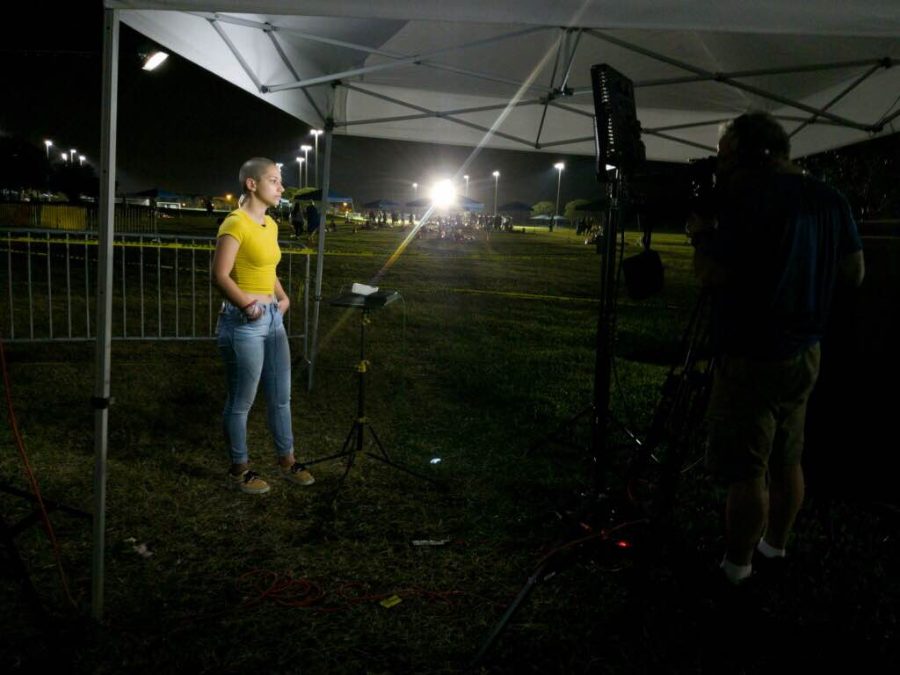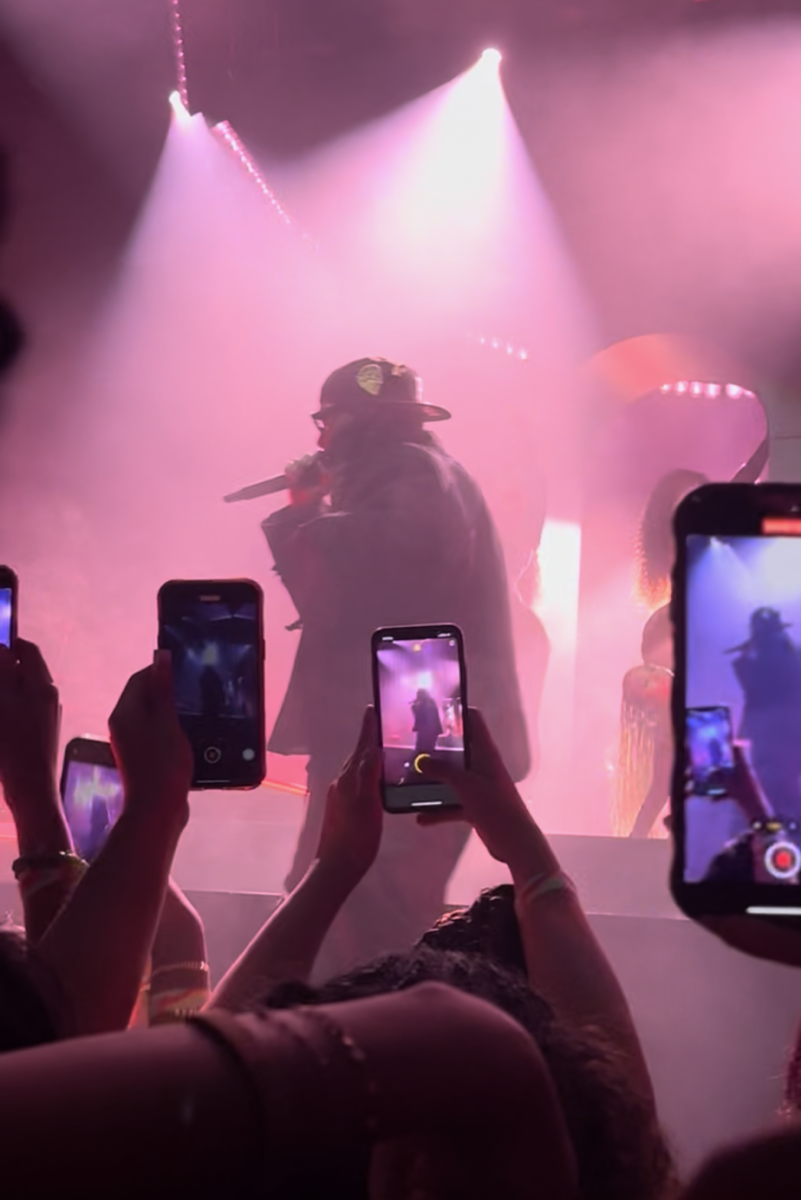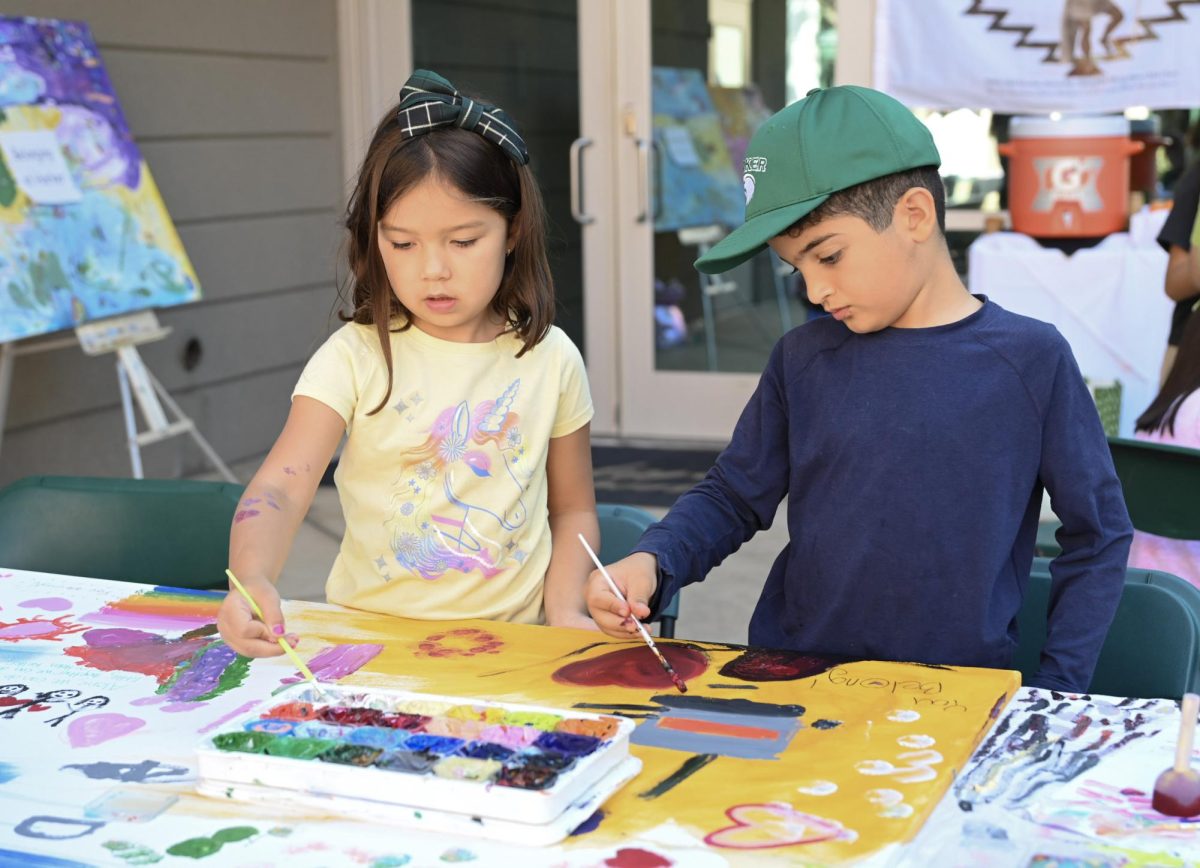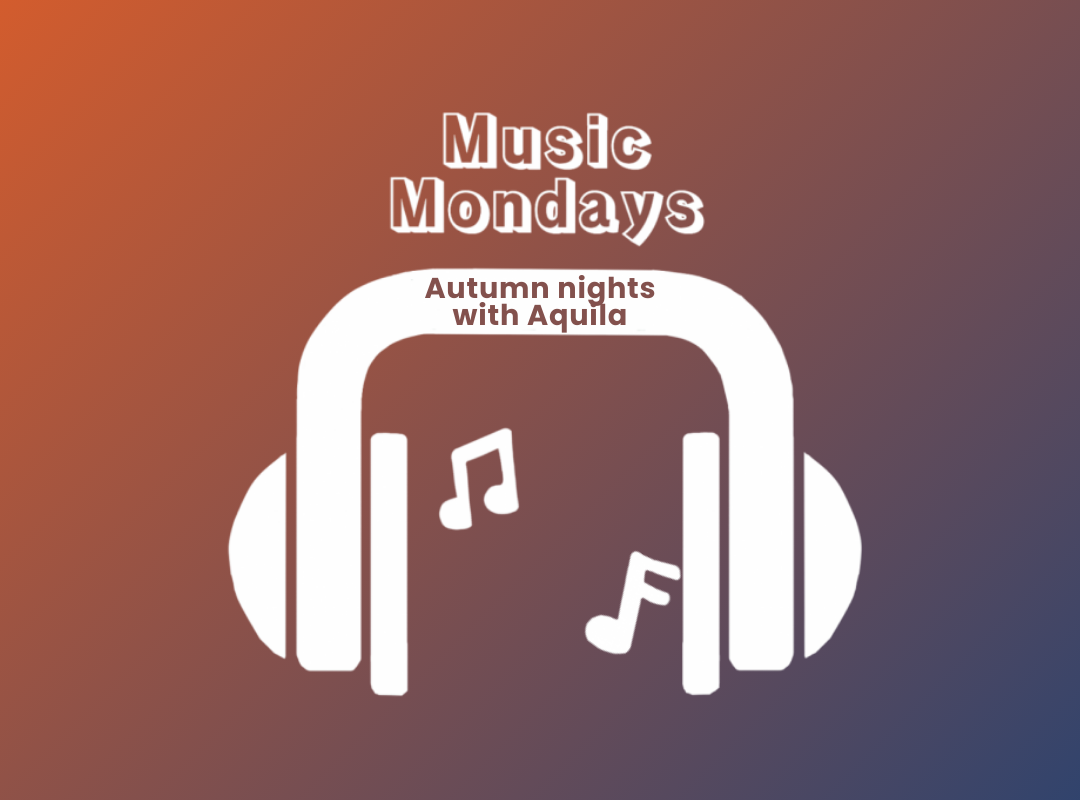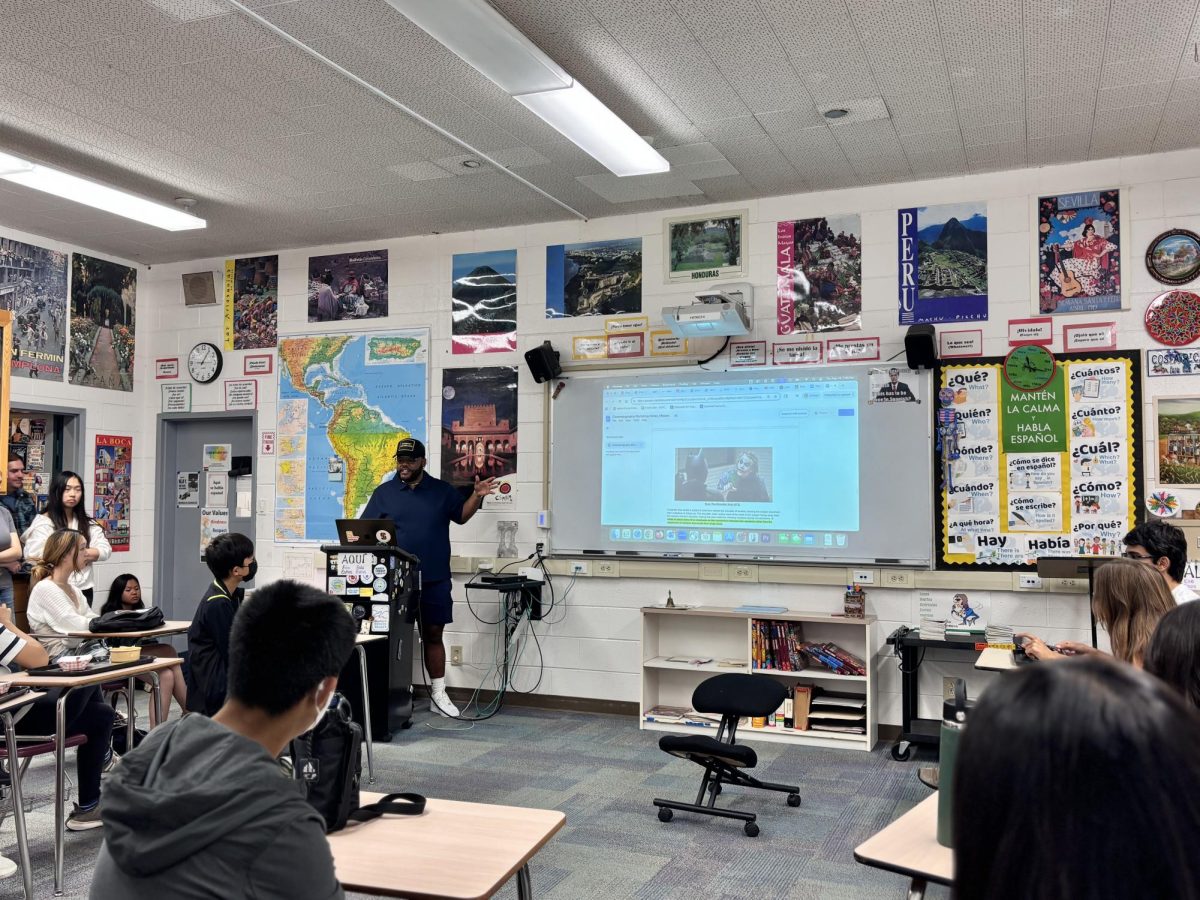Leading a movement: MSD student Emma González advocates for tighter national gun legislation
Provided by Emma González
Emma González, gun control activist and advocate, speaks in front of a camera for a broadcast. Emma co-founded the Never Again MSD movement following the Feb. 14 shooting at MSD.
March 9, 2018
For our Issue 5 spread on the Feb. 14 Marjory Stoneman Douglas High School shooting and the Never Again MSD movement, Winged Post staff had the opportunity to speak with MSD student Emma González. An avid embroiderer of pieces from her closet, Emma serves as the president of MSD’s GSA.
Winged Post: A lot of people have heard your “We Call BS” speech. What prompted you to send that message out to so many people?
Emma González: As I was writing it, I went along with whatever was going through my mind. I thought “We Call BS” sounds good, and if I can say it enough then I can maybe get people chanting. Instead of saying the actual curse words, I wouldn’t stoop down to anybody else’s level of cursing. There were going to be kids there, and this has got to be a family-friendly conversation. As family-friendly a gun control argument can be.
WP: Were you involved in any sort of gun control advocacy before?
EG: We had debates and stuff in class, [during] which we discussed things about our opinions on gun control. We never actually had clubs or organizations.
WP: What was the thought process that went into co-founding the Never Again movement specifically with your fellow advocates at school?
EG: Cameron Kasky came up with “Never Again” because it was kind of inspired by “Never Forget,” the Holocaust survivors, because he’s got Holocaust survivors in his family. “Never Again” was a way to easily say that we’re not going to take this lying down. It was going around on Instagram, tweet “Never Again” at 3-o’clock tomorrow afternoon and we can get it trending on Twitter and stuff. It was really nice.
WP: The Never Again movement, as you said, has been trending on social media platforms. What would say about the impact that social media has had on this movement, and how has social media helped you get a broader platform for your advocacy and your activism?
EG: We definitely would not have been able to get to where we are right now without social media. I was trending on Twitter after my speech, and I didn’t even have a Twitter. That made me get a Twitter and with the Twitter came a million followers, basically. The fact that we’re able to talk and so many people are able to listen has allowed us to stay here when in other situations, we would have been shunted off of stage because politicians don’t want to hear our voices; now, they have to listen because we are better at Instagram and social media and Twitter and Facebook than they are.
WP: Can we get some quick basic info: how old are you, and what grade are you in?
EG: I’m 18, and I’m a senior at Marjory Stoneman Douglas High School.
WP: What are your plans for after this school year?
EG: It’s not so much an after this school year sort of feeling; it’s more of an after the gun legislation that we want to get passed gets passed, I’m going to go to college and I’m going to have a good time in college.
WP: You mentioned that you wanted to get gun legislation passed. What else do you hope to achieve with the Never Again movement?
EG: “Never Again” means that we really want to make sure this never happens again. The gun legislation is just a part of it; we want increased background checks so that the people who really want to do a lot of damage with specific types of guns—and guns in general—can’t get their hands on guns. Specific guns like military-grade weapons, assault rifles, semi-automatic weapons, those would not be allowed to be purchased instantly. There’s also increased funding for teachers not on their classrooms but to supply their classrooms, which is what they deserve and should already have had by this point.
WP: One thing we talked about with David Hogg was that he thought schools should be prepared and have active shooter drills, which is actually something our school does. What do you think about that idea of preparing via these drills?
EG: I think it’s important to be prepared for anything that might happen. The fact that the teachers had been prepared for active shooters was a good thing, but it’s depressing that we have to practice them at all and that they should be practiced at all. We should practice them, but we shouldn’t actually be afraid that they would happen. We shouldn’t have to feel like they might happen.
WP: What are your thoughts on a recent proposal to arm teachers with guns in schools?
EG: Don’t do it.
WP: How busy are you in your day-to-day life? What’s your routine now? David mentioned that he was getting calls from a bunch of major news outlets, and I’m sure you are too.
EG: Normally, I would be at home watching a lot of Netflix, embroidering all of my clothes and trying to hang out with my friends as much as possible. But now, I’m trying to scale down on TV appearances because I don’t like it. I have a lot of things that I need to write now for magazines. I have to field a lot of text messages that are saying, “What are you doing, what are you doing, what are you doing?” and “Please meet with us because we deserve to have your voice on our show” or something like that.
WP: A lot of people have unfairly taken criticism of survivors of MSD, and there’s been some negative blowback of people accusing you of being actors. How do you deal with the hate?
EG: I ignore it. If you acknowledge it and try to explain it, you kind of end up feeding into it. The best way to deal with that type of stuff is to ignore it or make a joke about it. At the end of the day, those people try to undermine who we are as students, they try to attack our personalities, our mannerisms or feeling happy for 0.2 seconds after a tragedy like this. The reason why they do that is because they don’t want to believe that so many kids could be so much more well-spoken than they are, or that maybe we have an actual point that maybe guns need to be more regulated or military-grade weapons shouldn’t be used in civilian society. Maybe they don’t actually have an argument against us except direct attacks on who we are as people.
WP: What do you think are the best routes forward for people our age, like high schoolers and teenagers, who want to become more politically active?
EG: It’s actually surprisingly easy. At least in this scenario, since there were a lot of news people there. If you know what you’re going to say, say it powerfully. Don’t take no for an answer. Get a lot of people around you in support of what you’re doing. Get a well-thought out organization with a plan of how to work things and talk to people, because you’d be surprised how many are listening.
WP: As an activist, a woman of color and a member of the LGBTQ+ community, what’s it like being at the center of a media movement?
EG: It feels really weird and it’s not something that should have normally happened, and I’m glad that I can offer representation to the people like me. At the end of this, people are like, “You need to go run for president!” And I’m like, “No, I don’t, I need to go to college!”
WP: You referred to your AP Government class a few times in your speech. How would you say your high school education has prepared you for where you are now?
EG: It has incredibly prepared me; almost like perfectly for this situation. Not just my high school life, but my whole life—my parents raised me to be kind of a chill person, especially under pressure, so I’m able to handle quite a lot. We had so many debates about so many things, we have a politics club, I’m the president of GSA, we cover a lot of ground in school.
WP: What other student organizations are you involved in?
EG: Astronomy Club/Project Aquila, which is an atmospheric project where we launch a weather balloon attached to a box full of cameras—it goes to the edge of space, the balloon pops and we retrieve it.
WP: How are the teachers doing at your school?
EG: Oh, they’re doing so bad. These teachers should never have had to deal with this, and they’re taking it worse than anybody.
WP: Can we get some information about what your parents do?
EG: My mom is a math tutor, my dad is a lawyer.
WP: Can we get their names and how they’re spelled?
EG: If you wouldn’t mind, I’d like to keep their names out of this.
WP: When we talked to David, he talked about how he plans to take a gap year and work on midterms. I know you said you’re not thinking about college until after this legislation passes, but do you have an idea of what you want to do or if you want to be involved with midterms?
EG: I’m going to college; I have a college, I’ve been accepted, I’m going. Nothing’s going to stop me. The main thing on my mind right now is getting this legislation passed, but I’m putting my education right up there with legislation because that’s what we’re fighting for, a safe education. I don’t know what I would be majoring in, I wanted to major in astronomy.
WP: What’s the name of the college that you plan on attending?
EG: I would also like to leave the name of the college out of this, if that’s okay.
WP: As to the more national movement, how do you feel about the schools planning to participate in the March 14 walkout and the cities that are planning their own March For Our Lives events?
EG: We are so incredibly supportive of all of the people who are joining us. I could not be happier that they’re going out there and doing what they’re doing. We cannot thank them enough for the support that they’re showing.
WP: What do you see in store for the future of this movement?
EG: We see the march happening, and we see legislation being passed and we see all the people who voted against us in the midterm elections gone because some or most of us are going to be of voting age at that point in time.
WP: How have your interactions with other people changed since you became an activist?
EG: I’ve definitely been watching myself to make sure I don’t be negative to anyone in any situation. You know, there used to be those days when I’d just be cranky, but I’m not allowed to do that anymore. I’m not allowed to be anything less than perfect, I’m not allowed to be anything less than cheerful, but also grieving. I’ve gotten to know a lot more people through this because they’re like, “Hi! You don’t know me, but I know you!” and I’m like, “That is very true, I appreciate the support.” I’d like to go out on a limb and say I’m a generally kind person.
WP: What were you doing the week of the 12th before the shooting? What was your daily life like?
EG: I had a test coming up. For GSA, the day of, we had a love table. It was a proclamation of love; you would sign a little piece of paper that said, “Ahah, I love you, take this piece of paper that legally proves it! You know, unoffcially,” and it was really cute! Someone actually came up to me yesterday and said, “Thank you for making that table because that was the last thing I gave to my friend before she died, and it was an opportunity to tell her that I loved her, before she died.” And I was like, “Wow! Great! Now I’m going to cry. Wonderful!” But I do appreciate the opportunity that we were able to do that, and you know, crying’s healthy. Gotta let the tears flow when they do.
WP: In reaching so many people, through the Internet, through social media, what is your goal for the long run, after midterms, after the immediate future of activism that you’ve talked about?
EG: I don’t know, actually. As soon as we get what our goal is, I want people to forget about us and allow Marjory Stoneman Douglas to be the place where all the good stuff happens, rather than the place where that one great, awful, horrific school shooting occurred. I mean, that’s my personal opinion; I know a lot of other people are like, “I don’t want anybody to ever forget my name! And you get out there and you be politically active, kids!” But I don’t want that for myself.
WP: What kind of legislation do you want passed?
EG: First of all, we want the age at which one can buy a gun to be moved to 21, we want increased background checks, we want increased mental health care. Mental illnesses are unrelated to gun deaths, you know, shootings and stuff. It’s just that when they get together, they’re really bad, and that’s when they’re like, “This white man was mentally ill.” You know, some people are just born evil, and all they want to do is to create the max amount of havoc and have a name for themselves. Anyways, they’re kind of copping out on that by making it their scapegoat when, in fact, it is mainly the guns to blame for how bad the incidents get. You would not be able to kill that many people with a knife. If we could also get rid of those weapons that should have no place in civilian society, that would also be cool, really darn cool.
WP: Have there been any historical activists that have inspired you to take action or have influenced you in the methods you’re using to promote awareness of gun legislation?
EG: Not really. There’s no one I really thought in mind that I was like, “I’ve got to be like this person in my speech. This is the person that I am looking towards.” I was just like, “I’m so angry, and I cannot–” I was kind of looking towards the politicians, thinking, “If I could say this to their face, what would their emotion be, what would their face turn to?” I was less thinking of someone as an inspiration and more using the politicians as a negative inspiration to help me form my words better.
WP: What would you say is the major problem with those in political office right now who seem to be taking inaction towards this stance on gun control?
EG: They’re too easily influenced by money, and they’re not listening to the people who voted them into office in the first place. They don’t seem to care about the young voters because they think that the old voters will hold them up, but they forget that the old voters are parents and that their kids are incredibly influential, especially at this point in time, and they’re just… I can’t believe that bill got voted down yesterday. How stupid can you GET!? HOW STUPID!? WE’RE RIGHT HERE! AND WE ARE ALL WATCHING! AND IT GOT VOTED DOWN!!! We’re going to remember their names. I am going to make a cheat sheet so that people can remember what their names are when the midterm elections come around.
WP: With the change in your personal community and the different people within your own community stepping up, how has that support for MSD and your school in the wake of this helped?
EG: Everybody around us has been so incredibly supportive. Everybody who comes up to me says “Thank you. You’re building a better life for our children, all you guys.” There are other people who are like… there was a vigil for our school the day after, and someone in the evening part of the vigil was screaming, “You gotta arm the schools! If you armed the schools, this wouldn’t have happened!” and everybody who was there who had heard him knew that he had not been at the school because if he had, he would never have said something so insensitive, so untrue and so rude. But, you know, there are so many parents who are just so kind and so many students who are saying thank you and asking how they can get involved. You know, I don’t know what is going to happen to Parkland but at least right now, it’s very strong.
WP: What can younger students do to support you and support the movement?
EG: Repeat #NeverAgain and follow @MarchForOurLives, and go to the march and support all of the marches around you. If you can’t go to the march in D.C., go to a march in any other place; they’re going to be all over the world and the country. Start petitioning for things. Always tell the important people in your life that you love them, because they deserve to hear that, and you deserve to have good people around you that would love you too.
WP: What advice would you give to young, inspiring activists, maybe students like yourself, who hope to make change like you have?
Eg: Find a good platform, find good people around you, check on the fact that there’s going to be a lot of people who don’t support you; you need to remember to ignore those people and that if they’re not directly impacted by whatever your topic is, they don’t matter. But you do need to listen to the people who say you’re doing something wrong, you’ve got to check yourself, you’ve got to make sure that you aren’t doing something wrong.
WP: What actions can schools and people take to support the MSD community?
EG: Donate to our GoFundMe that’s been set up. There’s the march one, but there’s also one that has been set up for the victims. The victims have gotten so much money. I’m so happy for them. Social media support is just as impactful as saying to somebody in person “I support you.” Doing anything at this point is.
Stay strong. Always make sure to buy good quality socks because you never know when all of a sudden you have no more socks and you’re down to the really awful pair, and you have to march that day. Always have an extra pair of socks.
A shorter version of this piece was originally published in the pages of the Winged Post on March 6, 2018.


















![“[Building nerf blasters] became this outlet of creativity for me that hasn't been matched by anything else. The process [of] making a build complete to your desire is such a painstakingly difficult process, but I've had to learn from [the skills needed from] soldering to proper painting. There's so many different options for everything, if you think about it, it exists. The best part is [that] if it doesn't exist, you can build it yourself," Ishaan Parate said.](https://harkeraquila.com/wp-content/uploads/2022/08/DSC_8149-900x604.jpg)




![“When I came into high school, I was ready to be a follower. But DECA was a game changer for me. It helped me overcome my fear of public speaking, and it's played such a major role in who I've become today. To be able to successfully lead a chapter of 150 students, an officer team and be one of the upperclassmen I once really admired is something I'm [really] proud of,” Anvitha Tummala ('21) said.](https://harkeraquila.com/wp-content/uploads/2021/07/Screen-Shot-2021-07-25-at-9.50.05-AM-900x594.png)







![“I think getting up in the morning and having a sense of purpose [is exciting]. I think without a certain amount of drive, life is kind of obsolete and mundane, and I think having that every single day is what makes each day unique and kind of makes life exciting,” Neymika Jain (12) said.](https://harkeraquila.com/wp-content/uploads/2017/06/Screen-Shot-2017-06-03-at-4.54.16-PM.png)








![“My slogan is ‘slow feet, don’t eat, and I’m hungry.’ You need to run fast to get where you are–you aren't going to get those championships if you aren't fast,” Angel Cervantes (12) said. “I want to do well in school on my tests and in track and win championships for my team. I live by that, [and] I can do that anywhere: in the classroom or on the field.”](https://harkeraquila.com/wp-content/uploads/2018/06/DSC5146-900x601.jpg)
![“[Volleyball has] taught me how to fall correctly, and another thing it taught is that you don’t have to be the best at something to be good at it. If you just hit the ball in a smart way, then it still scores points and you’re good at it. You could be a background player and still make a much bigger impact on the team than you would think,” Anya Gert (’20) said.](https://harkeraquila.com/wp-content/uploads/2020/06/AnnaGert_JinTuan_HoHPhotoEdited-600x900.jpeg)

![“I'm not nearly there yet, but [my confidence has] definitely been getting better since I was pretty shy and timid coming into Harker my freshman year. I know that there's a lot of people that are really confident in what they do, and I really admire them. Everyone's so driven and that has really pushed me to kind of try to find my own place in high school and be more confident,” Alyssa Huang (’20) said.](https://harkeraquila.com/wp-content/uploads/2020/06/AlyssaHuang_EmilyChen_HoHPhoto-900x749.jpeg)



